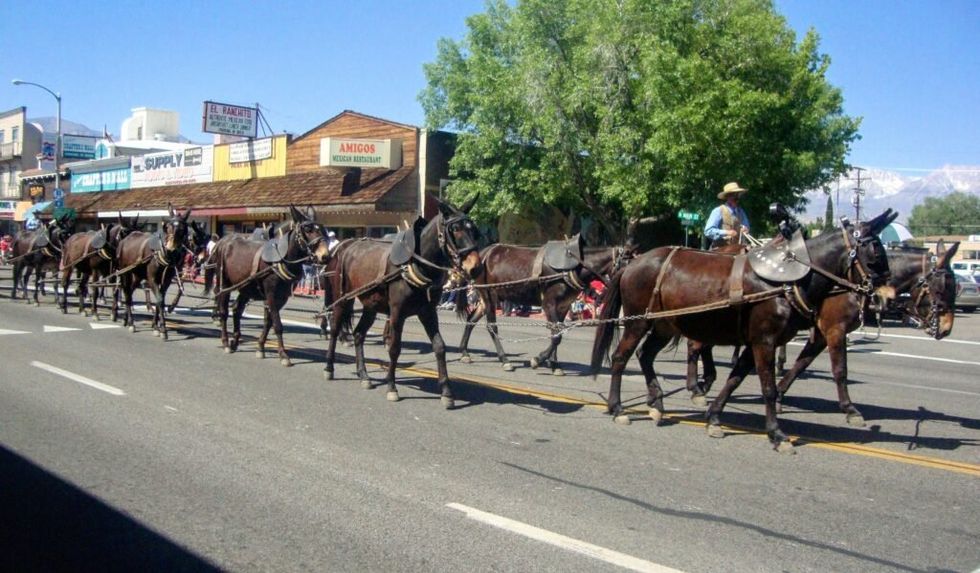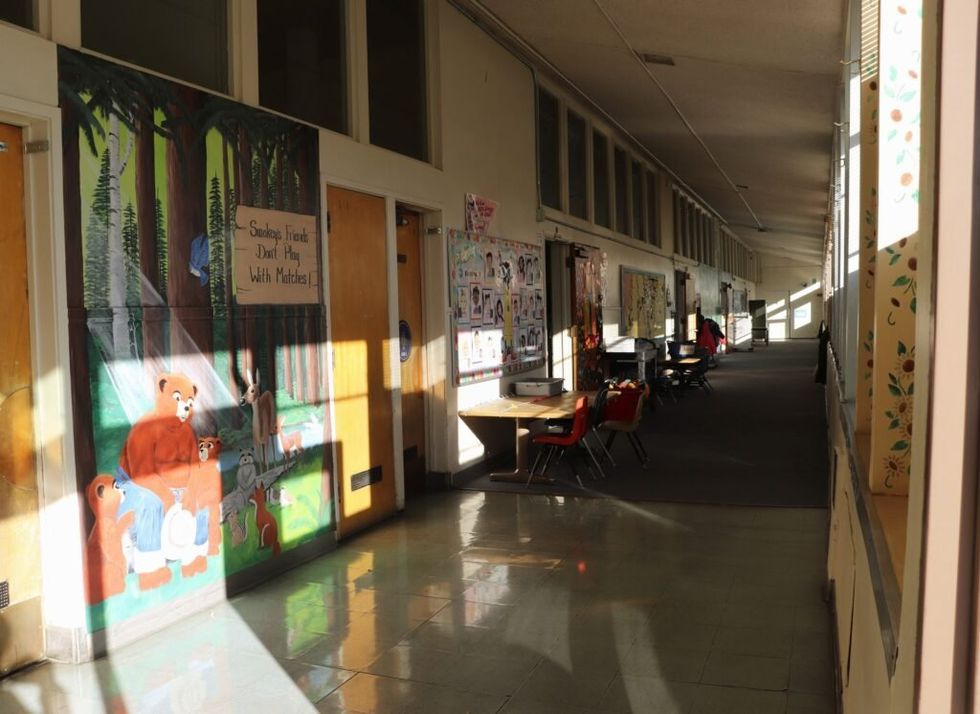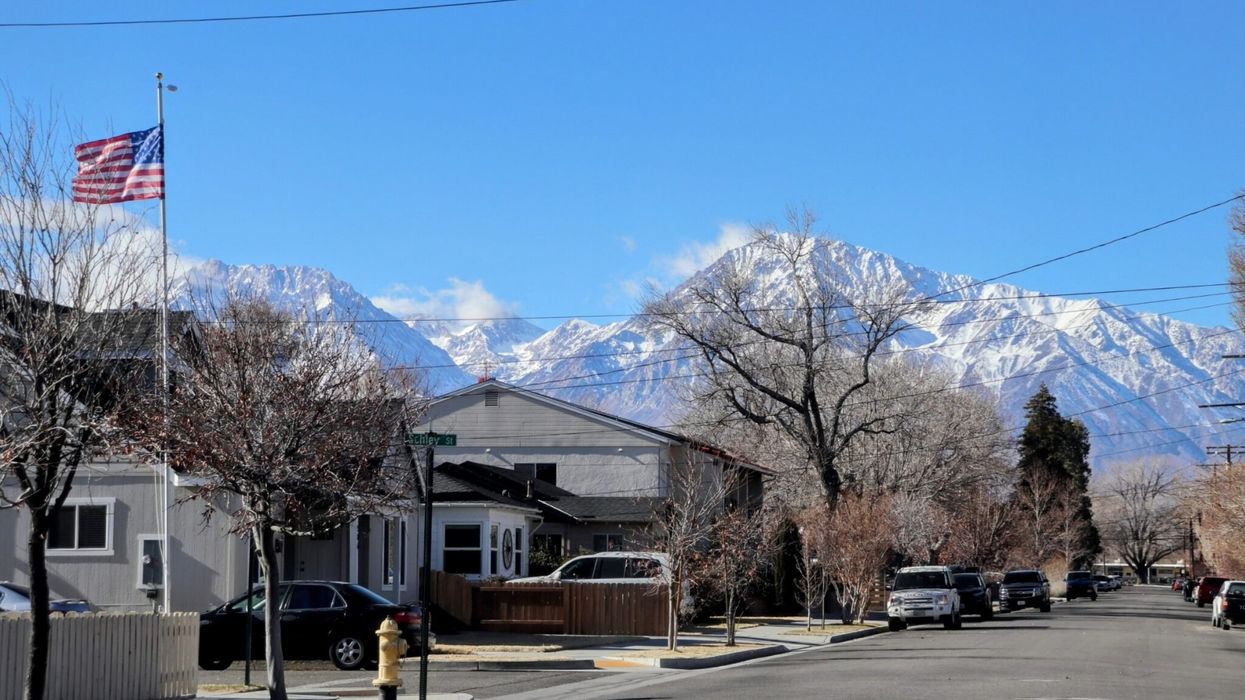With President Donald Trump’s inauguration, the Latino community of the self-proclaimed “Mule Capital of the World”—the city of Bishop, California—remains torn.
Biden took Inyo County by the narrow margin of 14 votes in 2020, while Trump won by 267 votes this year, according to an election summary report.
Ana Whitmore, a Latina who has spent the past fifteen years teaching TK-5 Spanish Dual Immersion in Bishop and nearby Mammoth Lakes, said she believes the right-wing appealed to the “religious revival” playing out within Bishops' Latino community.
The revival created “a sway back into Catholic and conservative values on issues like abortion,” Whitmore said.
Meanwhile, Carlos Cruz, a handyman who moved to Bishop in 2007 to provide for his family in Mexico, suggested that Latinos turned to the Republican Party searching for economic relief.
“Every Latino wants to live better,” he said. “And Trump is a business guy. He’s going to raise the country again. Try to make [it] better.”
Cruz is not alone. Approximately 52% of Latinos rated the cost of living and inflation as their top priorities in this year’s election, and s ome reports point to Trump's win as a reflection of the Democratic party’s failure to address working-class issues, ultimately leading to Harris’s loss.
Yet there is little evidence that suggests Trump will prioritize the needs of everyday, working-class Americans when he takes office.
During his first presidency, Trump tried to raise the rent for 4 million low-income households, force single mothers to reveal their sexual histories before receiving welfare, transfer $5.8 billion in workers' tip money to employers, and attack workers' rights to collective bargaining, according to several reports.
In November last year, Trump announced plans to declare a national emergency and order the U.S. military to conduct mass deportations.
This plan could rip apart the 6.3 million mixed-status households, which account for nearly 5% of the country’s population.
But Cruz said, “Latinos aren’t scared about being deported. Trump was already President, and he didn’t do it that bad for us.”
Trump’s first-term family separation policy at the southern border was described as one of “the cruelest and most shameful chapters in recent American history” by MSNBC News.
Thousands of children were forcibly taken from their parents and transferred to shelters nationwide.
 A string of mules walk past Mexican restaurants during the annual Mule Days parade in Bishop, CA. Robin Linse
A string of mules walk past Mexican restaurants during the annual Mule Days parade in Bishop, CA. Robin Linse
Despite this recent history, Cruz believes mass deportations are “unlikely” to occur.
“It’s not like the President is going to take all the hard workers. He’s going to go for the money,” he said. “But if they do send me back to Mexico, I won’t really have a problem because I’ll just work harder there to build up my country.”
Nearly 1 in 10 California workers are undocumented immigrants, with immigrants representing 1 in every 3.
A mass deportation event would drastically deplete the workforce, increasing prices for all Americans by 9.1% and slashing the GDP by up to 7.4% over the next four years, according to reports.
The wildfires consuming over 40,000 acres and 12,000 structures in the Greater Los Angeles area as of January 13th have further eased Cruz’s mind.
“LA is going to need a lot of help to rebuild these houses. Who is going to help them but immigrants?” Cruz questioned.
However, Karen Rivas, a Bishop local and first-year student at John Jay College of Criminal Justice was among the 58% majority of Latinas who chose Democratic candidate Kamala Harris.
Rivas said the fact that 54% of Latino men voted for Trump “felt like a stab in the back as a Latina. This man waged war against Hispanics and women, treating us like criminals and aliens, and you’re still going to vote for that?”
Because Bishop is a small, rural town, “ICE doesn’t come here often, but when they do it is a big deal in the Latino community,” Rivas said. “There’s always this inherent fear of losing my family, losing my parents, because of these threats.”
Some Latinos have already withdrawn from the Bishop community for fear of deportation.
On December 14, 2024, some Latino families opted to remove their children from the holiday “ Shop-with-a-Cop ” program in which low-income students pick out toys with law enforcement officers, fearing police could record their address and return to search for undocumented residents.
 Murals decorate the kindergarten hall where Ana Whitmore teaches. Robin Linse
Murals decorate the kindergarten hall where Ana Whitmore teaches. Robin Linse
Some families are also worried about sending their kids to school.
During Trump’s first term, Nancy Hagopian, a Hispanic Liaison at Bishop Elementary, tried to assure parents of their student’s safety with letters and phone calls via the district office.
“But now parents are afraid that that is changing. You can see kids come here, their mind is somewhere else,” she said. “They try to play, learn, and all that, but they sense fear at home.”
Hagopian said her students have told her they don’t want to speak Spanish because classmates told them, ‘Go back to your country,’ and students playing soccer have replaced insults of ‘Oh, you’re slow; bad at running’ with ‘Oh, you’re Mexican.’
“Whether they are Mexican or not, it doesn’t matter. It’s a racist comment equating them with not belonging,” Hagopian said.
However, not everyone has noticed tensions rising in the classroom.
Ana Whitmore, the Spanish Dual Immersion teacher, said she remembers her kindergarten students “voiced concerns over immigration,” during the 2020 election, but “this time around, I have not heard it.”
Regardless, Whitmore said she is “nervous for some students.”
“Being an immigrant myself when I was younger, that was always a source of anxiety,” Whitmore added.
Not all teachers are as open to discussing identity and politics in the classroom.
Last Thursday, Hagopian met with school district superintendent Katy Kolker to discuss designing a class for teachers to better support and empathize with their immigrant students.
Regardless of political alignment, some Latinos hope to build a more unified Bishop for their children.
Rivas’ father started a soccer group for Latinos over the age of forty, the Seventh Day Adventists started a Hispanic support group, and Cruz hopes to see Bishop’s folklórico dance group perform in the 56th annual Mule Days parade.
Cruz said there is only one way to survive the hard days ahead, and that’s realizing “we’re all family—Hispanics and whites. We have to work together and keep each other going.”
Robin Linse explores the interplay between culture, language, and the environment as a student at Grinnell College.



















 From left to right: Gabriel Cardona-Fox, Bud Branch, Joe Concienne
From left to right: Gabriel Cardona-Fox, Bud Branch, Joe Concienne 
Trump & Hegseth gave Mark Kelly a huge 2028 gift